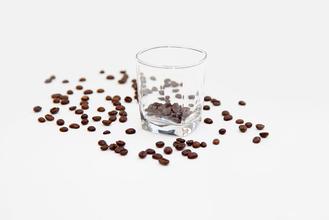Introduction to varieties of Brazilian Coffee Bean planting Base Map Brand planting conditions and Flavor description
Introduction of Brazilian boutique coffee beans
Finally, the host warmly invited us into the coffee shop of the manor. A black woman brewed a cup of coffee for each of us with freshly ground hot coffee beans in the traditional way, but she felt a strong fragrance and fine taste. Its taste is not comparable to that of ordinary instant coffee. After drinking it, it is still full of aftertaste. This is the most delicious coffee we have ever had.
Brazilians love coffee and are good at drinking coffee. Coffee with hot milk is a traditional breakfast drink throughout Brazil. Brazilians call breakfast "morning coffee" (cafedamanha). They drink coffee before going to work, during meetings, and often stand in front of a street cafe for a drink when walking down the street. In short, coffee is an indispensable source of energy for most Brazilians. Small black coffee, dark color, strong flavor, mellow and delicious, it is best to add a little more sugar, as the Brazilian folk song sings: "Coffee must be as black as the devil, as hot as hell, as pure as an angel, as sweet as love." When you arrive in Brazil, don't forget to taste the delicious "Coffee Sinio".
Top Brazilian coffee may not always be easy to get. Because, after the United States, Brazil itself has become the world's largest consumer of coffee and is still growing rapidly. A large number of high-quality coffee has found a place in the home market, and consumers' tastes are becoming more and more picky.
Although coffee is diverse, Brazilian coffee is suitable for the taste of the public. For example, coffee produced in the northern coastal areas has a typical iodine taste, reminiscent of the sea after drinking. This coffee is exported to North America, the Middle East and Eastern Europe.
Today, Brazil's brand as the origin of specialty coffee has been established, and the Brazilian Special Coffee Association (BSCA), which has many of Brazil's most important producing areas, represents the interests of the world's top coffee growers and the most advanced coffee production technology. In Missouri, for example, production has soared in the central region of Serrado over the past few years. Here, the vast Datterra plantation is not only the largest plantation in the world, but also a benchmark for producing high-quality coffee. Some traditional coffee plantations in the south of the state, such as Lapanema, Alfenas and Vista Allegre, also regularly produce some of the region's top coffee.
Including all coffee beans grown in Brazil, except for Santos, Brazilian beans are mostly "cheap and good" coffee. Can be used for mass production of comprehensive coffee beans, most of which are re-roasted. The main raw material of instant coffee is also Brazilian coffee beans. When the coffee bean germ is very fresh, it is artificially refined and naturally dried in the vulva for about 60-70 days, so that the sweetness of the pulp fully infiltrates into the bean. Features: coffee beans have a strong aroma, moderate bitterness, high texture acidity, soft overall taste, low acidity and endless aftertaste. The taste of Brazilian coffee has a low sour taste, with the sweet and bitter taste of coffee, the entrance is very smooth, but also with a hint of grass aroma, slightly bitter in the fragrance, smooth and smooth, with a pleasant aftertaste. There are no outstanding advantages for Brazilian coffee, but there are no obvious drawbacks. It has a mild and smooth taste, low acidity and moderate mellowness.

Important Notice :
前街咖啡 FrontStreet Coffee has moved to new addredd:
FrontStreet Coffee Address: 315,Donghua East Road,GuangZhou
Tel:020 38364473
- Prev

Boutique Coffee beans-- Coffee cooked beans how to drink Costa Rican Tarazu
Because of the coffee industry, Costa Rica is a more advanced profession. Coffee farmers have a high status in Costa Rica. In 1897, citizens of the capital witnessed the completion of the National Theater donated by coffee tycoons. Coffee wealth brings stability to Costa Rica's politics, economy and democracy, which is rare in Central American countries. In addition, Colombia has laws that only allow the planting of Arabica and Drogba
- Next

Introduction to the quality of Sunshine Yega Coffee and Sidamo Coffee
Sun-washed coffee is not easy to have wild flavor, and has pure and refreshing characteristics, which is suitable for the baking degree from City to Full City. In some Ethiopian water-washed coffee beans with excellent nature, obvious rising lemon, citrus essential oils, jasmine and honey can be detected, and the sour taste is obvious.
Related
- Detailed explanation of Jadeite planting Land in Panamanian Jadeite Manor introduction to the grading system of Jadeite competitive bidding, Red bid, Green bid and Rose Summer
- Story of Coffee planting in Brenka region of Costa Rica Stonehenge Manor anaerobic heavy honey treatment of flavor mouth
- What's on the barrel of Blue Mountain Coffee beans?
- Can American coffee also pull flowers? How to use hot American style to pull out a good-looking pattern?
- Can you make a cold extract with coffee beans? What is the right proportion for cold-extracted coffee formula?
- Indonesian PWN Gold Mandrine Coffee Origin Features Flavor How to Chong? Mandolin coffee is American.
- A brief introduction to the flavor characteristics of Brazilian yellow bourbon coffee beans
- What is the effect of different water quality on the flavor of cold-extracted coffee? What kind of water is best for brewing coffee?
- Why do you think of Rose Summer whenever you mention Panamanian coffee?
- Introduction to the characteristics of authentic blue mountain coffee bean producing areas? What is the CIB Coffee Authority in Jamaica?

